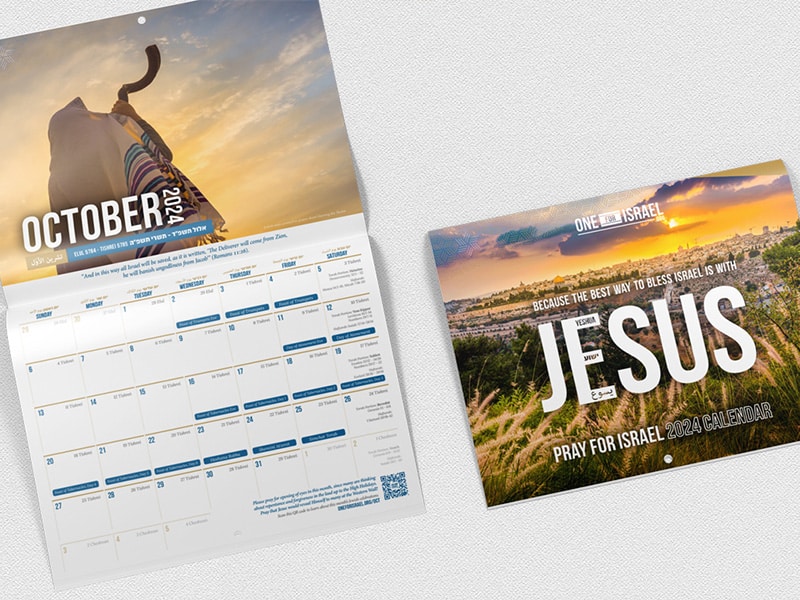Is Zion a concept or a geographical spot? Perhaps it’s both. God had marked the geographical location where He would redeem the world to Himself. Even while they were still in Egypt, God had already chosen the place where His name would dwell:
And you shall offer the Passover sacrifice to the Lord your God, from the flock or the herd, at the place that the Lord will choose, to make his name dwell there. (Deuteronomy 16:2)
God had set aside His holy mountain but didn’t disclose its location at that time. This would be the spot where Jesus would pay for the sins of the world, and be raised again from the dead. That event was decided and spoken of even in the Garden of Eden. So it should come as no surprise to us that the Passover foreshadows the cross in so many ways. It was all planned and foreseen before time began. The Lord knew very well the place He would choose to redeem the whole world.
Zion: A place marked by God
There were three feasts that had to be celebrated in that designated spot. There was the Feast of Passover, Shavuot (the Feast of Weeks) and Sukkot (the Feast of Tabernacles). The feasts all point to Jesus and His salvation plan. What is so wonderful is that Mount Zion, God’s holy hill, would be the scene of not just one event of cosmic import, but several. In concentric circles of significance, we see Abraham’s beloved son Isaac climbing that same hill, carrying the wood on his back for his own sacrifice and an angel intervened. Later, the hand of an angel of God’s wrath was stopped right in that place, at the time of King David. Then of course comes Calvary, where death itself was soundly beaten, and Jerusalem is the city to which the Messiah will return in glory, from which He will rule and reign over all the earth.
The word Zion evokes Messianic notions of salvation, redemption and kingdom, but it is also a real, physical place because the Bible is a true story.
The Bible is not just a set of instructive fairy tales like Aesop’s Fables—the history and geography is real, as the steady flow of archaeological discoveries testify. The words of prophecy that have come to pass so far have done so with astonishing accuracy—why would it suddenly cease to be literally correct? Many who object to the apparent ethnocentrism of a Biblical narrative being rooted in the soil of Israel are ironically proposing an egocentric version where all the promises apply to the individual. But God’s way has always been to have His chosen servant as a vessel to redeem all the families of the earth; Isaiah’s “servant of the Lord” sometimes refers to the Messiah, sometimes to the nation of Israel, and other times to the prophet himself. Israel is God’s chosen people through whom He would carry out His story, and Zion is God’s chosen place: His HQ, His base of operations. It is from Zion that God executed His international rescue and deliverance plan for the world, and it is in Zion that He will establish His global governance and kingdom rule. This is the Davidic Covenant, the sure mercies of David.
For the Lord has chosen Zion; he has desired it for his dwelling place:
“This is my resting place forever; here I will dwell, for I have desired it.”
(Psalm 132:13)
Zion: The epicenter of redemption
Bill Schofield points out that the entire Gospel is bound up with Jerusalem, because the Good News of Jesus is not just a matter of personal salvation from sin, but God redeeming all things to Himself. This is the ultimate goal, and the cross His means to that end. This fact is often lost in much of Christian theology which was developed in the wake of a destroyed temple and an apparently irrelevant holy city. But that is not how the Bible sees it.
Here’s how the prophet Isaiah announces the Good News:
How beautiful upon the mountains
are the feet of him who brings good news,
who publishes peace, who brings good news of happiness,
who publishes salvation,
who says to Zion, “Your God reigns.”
The voice of your watchmen—they lift up their voice;
together they sing for joy;
for eye to eye they see
the return of the Lord to Zion.
Break forth together into singing,
you waste places of Jerusalem,
for the Lord has comforted his people;
he has redeemed Jerusalem.
The Lord has bared his holy arm
before the eyes of all the nations,
and all the ends of the earth shall see
the salvation of our God.
(Isaiah 52:7-10)
There are four references to Zion / Jerusalem in this short passage about the Good News, and five more just in the first two verses at the beginning of the chapter. Here we can see both the redemption won at calvary and the future redemption to come—both based in Zion and reaching the ends of the earth.
In Hebrew the word for good tidings, or gospel, is besora (בשורה), and the bringer of the message is a mevaser (מבשר). According to scholar Andrew J. Spallek, implicit in the word is the concept of specifically good news. Why? It was originally connected to messengers bringing word in battle. It had connotations of victory.3 The Gospel is news from the battlefield: Jesus has conquered. It is this concept, the bringer of good news, specifically to Zion, (מבשרת ציון) that is spoken of in Isaiah 40 when the prophet begins with the words, “Comfort, comfort my people!” The NKJV renders it like this:
“O Zion, You who bring good tidings, get up in the high mountain; O Jerusalem, you who bring good tidings, lift up your voice with strength,
Lift it up, be not afraid; say to the cities of Judah, “Behold your God!”” (Isaiah 40:9)
The ESV has it like this:
“O herald of good news to Zion, O herald of good news to Jerusalem…”
Whether Jerusalem is the bringer or the receiver of good news (or both), the Gospel is closely bonded with Zion. Isaiah 61 affirms this: The message is to console those who mourn in Zion. The coming redemption, both from sin and death, and later in completion and wholeness, is inseparable from God’s holy city. It’s where the victory was won, and where God’s kingdom rule flows out from to the nations.
Until… It’s just a matter of time
There are several key times in the Bible that the word “until” is used. The story of God has a beginning, a middle, and an end. One thing follows another in a sequence of events and time was created so they wouldn’t all happen at once. There was a temple until the Romans destroyed it, for example. And here are a few key times the word until appears, concerning God’s plans for Zion:
Jerusalem will be trampled underfoot by the Gentiles, until the times of the Gentiles are fulfilled. (Luke 21:24b)
Jesus prophesied the fall of Jerusalem and the destruction of the temple, but critically that there would be a day when His holy city would no longer be “trampled underfoot by the Gentiles. He speaks of “the times of the Gentiles” as a finite time period. We see this again in Romans 11 when Paul speaks of God’s plan of salvation for the whole world, and how the Jewish people would be partially hardened against the Gospel for a limited time, until…
A partial hardening has come upon Israel, until the fullness of the Gentiles has come in. And in this way all Israel will be saved, as it is written,
“The Deliverer will come from Zion, he will banish ungodliness from Jacob”;
“and this will be my covenant with them when I take away their sins.”
As regards the gospel, they are enemies for your sake. But as regards election, they are beloved for the sake of their forefathers. For the gifts and the calling of God are irrevocable. (Romans 11:25-29)
The day that the Deliver will come from Zion banishing ungodliness from Jacob has not yet occurred, but it’s coming! Indeed it must happen, as Jesus warned He would not return until the people of Jerusalem welcome Him with open arms and open hearts:
“O Jerusalem, Jerusalem, the city that kills the prophets and stones those who are sent to it! How often would I have gathered your children together as a hen gathers her brood under her wings, and you were not willing! See, your house is left to you desolate. For I tell you, you will not see me again, until you say, ‘Blessed is he who comes in the name of the Lord.’” (Matthew 23:37-39)
The city of the Great King
Sing and rejoice, O daughter of Zion, for behold, I come and I will dwell in your midst, declares the Lord. And many nations shall join themselves to the Lord in that day, and shall be my people. And I will dwell in your midst, and you shall know that the Lord of hosts has sent me to you. And the Lord will inherit Judah as his portion in the holy land, and will again choose Jerusalem.” (Zechariah 2:10-12)
Clearly, some of the prophecy in Zechariah 2 has been fulfilled in the incarnation as He came to dwell among us as Immanuel: God with us. But He will again choose Jerusalem, when He comes again in glory. He is indeed King of the Jews, but more than that, King of Kings and Lord of Lords (Revelation 19:16). The King of all the earth has chosen, and will again choose Jerusalem. As Jesus Himself taught:
“But I say to you, Do not take an oath at all, either by heaven, for it is the throne of God, or by the earth, for it is his footstool, or by Jerusalem, for it is the city of the great King.” (Matthew 5:34-35)
“Let us start reading our Bibles with the thought that God means exactly what He says.” A.W. Tozer
Zechariah 8 and Isaiah 62 also make it quite plain how very passionately God feels about Zion, and that His plans for the city continue on into the future. Not only would He dwell there, vanquish death there, return there and rule there, but the kings and leaders of the earth will come to seek Him there. We see this picture in Isaiah 2 and Micah 4, both of which talk about the Messianic Age of peace, in which many from the nations will flock to Zion:
It shall come to pass in the latter days that the mountain of the house of the Lord shall be established as the highest of the mountains, and it shall be lifted up above the hills; and peoples shall flow to it, and many nations shall come, and say: “Come, let us go up to the mountain of the Lord, to the house of the God of Jacob, that he may teach us his ways and that we may walk in his paths.” For out of Zion shall go forth the law, and the word of the Lord from Jerusalem. (Micah 4:1-2)
This last phrase, “Out of Zion shall go forth the law, and the word of the Lord from Jerusalem” is held dear to us at ONE FOR ISRAEL. We want to help fill the earth with God’s glory, and with understanding of His ways. We want to help people appreciate the wonder of God’s word and unpack it as God’s Spirit enables us. But none of our efforts will compare to what is coming when the Messiah returns. All Israel will be redeemed and in right relationship with our God while King Jesus rules from David’s throne in Jerusalem. As Paul writes in Romans 11, what will this mean but life from the dead?! Riches for the whole world… metaphorically, spiritually, and in real, actual fact.
“The city of Jerusalem is the epicenter of global redemption in world to come, this is where the Messiah will rule from.” – Bill Schofield
- Andrew J. Spallek, The Origin and Meaning of εὐαγγελιον in the Pauline Corpus, Concordia Theological Quarterly 57:3, p.180
With appreciation of Bill Schofield and his thoughts on the connections between Zion and the Gospel













